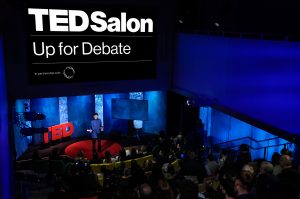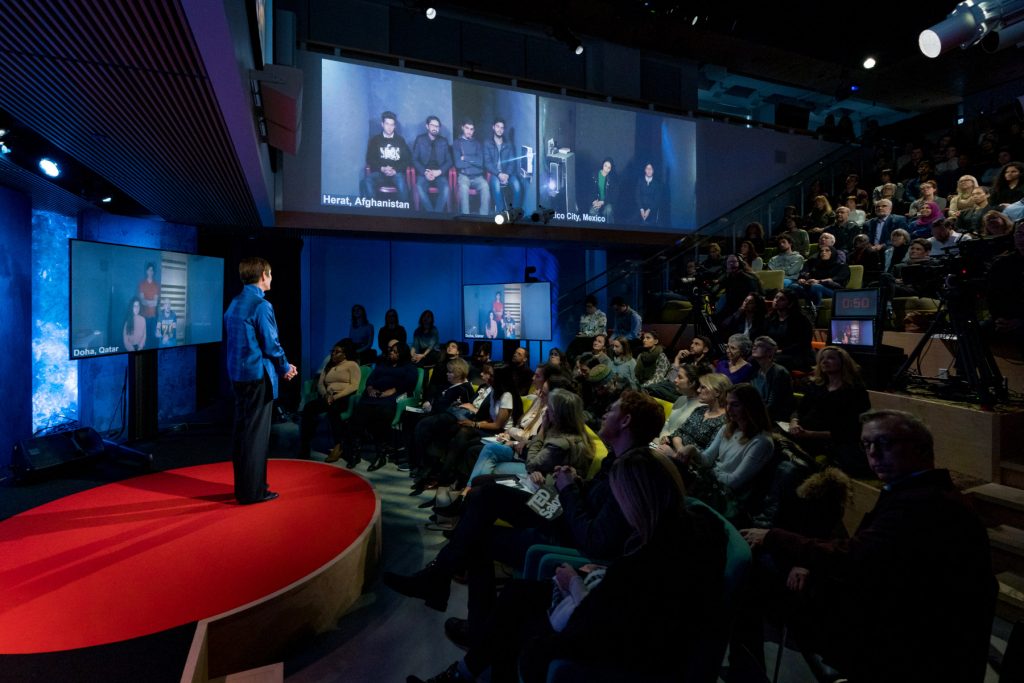Up for Debate: Ideas and Solutions From TED and Doha Debates

In an increasingly polarized and passionate media landscape, where news competes with noise and facts compete with shouts of fakeness and misinformation, the need for honest dialogue and genuine conversation across differences has never been more urgent. That’s the inspiration behind the TED Salon “Up for Debate,” a session of talks curated in partnership with Doha Debates about the importance of civic discourse and debate, hosted by TED Residency director Cyndi Stivers in New York City on January 16.
As five speakers took the stage at the TED World Theater, five groups of people joined live onscreen from around the world via Portals — the walk-in shipping containers equipped with audiovisual devices to beam them in from Doha, Qatar; Kigali, Rwanda; Herat, Afghanistan; Hardy County, West Virginia; and Mexico City. Designed by our partners at Shared_Studios, the Portals allowed speakers to share thoughts on the most pressing issues in their parts of the world and respond in real time to the speakers in New York.
After an opening performance by the band Brooklyn Nomads, the session kicked off with journalist Steven Petrow discussing what “civility” looks like today.
Civility shouldn’t be a dirty word
What does it mean to be a “civilist” — someone who tries to live by a moral code — in a world where “civility” is seen as a dirty word? As Petrow views it, the political right conflates “civility” with political correctness in the U.S. and dismisses it as a tool by the left to demonize opponents. Civility is also attacked by voices on the left as immoral when it amounts to acquiescence to injustice rather than protest against injustice.
But does civility actually stifle debate? Not according to Petrow, who says civility doesn’t have to mean appeasement or avoiding important differences. It means listening and talking about those differences with respect — respect for the people (if not the ideas) opposing you. Reasonable discussions are crucial to a healthy democracy, but hate speech, cyberbullying and threats are not, because threats suppress conversation by telling one side, “Shut up or else.”
What’s needed are rules of engagement, Petrow argues — “a Geneva Convention of civility to become better citizens.” He suggests three ways for citizens to have productive dialogues: deescalate language; challenge policies and positions, not character; and don’t mistake decorum for civility.
 Reniqua Allen speaks at TEDSalon: Up for Debate, January 16, 2019 at the TED World Theater, New York, NY Photo: Ryan Lash / TED
Reniqua Allen speaks at TEDSalon: Up for Debate, January 16, 2019 at the TED World Theater, New York, NY Photo: Ryan Lash / TED
The secret recipe to starting a movement
According to human rights organizer Rana Abdelhamid, who spoke at the event, there are three ingredients for creating an international movement: Start with what you know, start with who you know, and above all, start with joy.
Abdelhamid remembers when a stranger aggressively tried to remove her hijab when she was 16, which inspired Abdelhamid (a first-degree black belt) to teach self-defense to women and girls in a community center. But she soon realized that she didn’t want the class to focus on fear. Instead, she wanted students to experience the class as an exercise in mental and physical well-being.
That class evolved into Malikah, a grassroots organization spanning 17 cities in 12 countries that offers security and self-defense training specific to people’s environments.
 Audience members in a Portal onscreen in Doha, Qatar, speaking live with event host Cyndi Stivers in New York. (Photo: Ryan Lash / TED)
Audience members in a Portal onscreen in Doha, Qatar, speaking live with event host Cyndi Stivers in New York. (Photo: Ryan Lash / TED)
Next at the event, speaking onscreen from Doha, Qatar, students gathered in a Portal to explain how the media has shaped their lives, from employment to health to education. The students explored how certain news outlets promote bigotry and manipulate people in dangerous ways, sparking a debate about the media’s role in public conversations.
From the Portal in Mexico City, students explained how, on the heels of their country’s transformative election, it’s more pressing than ever to work across differences and understand that people have shared interests grounded in kindness: “Now, kindness is the ultimate intelligence.”
Real dialogue is possible
Journalist Eve Pearlman, a featured speaker, talked about her mission to bridge the political divide in the United States. With the help of journalist Jeremy Hay, she founded Spaceship Media, dedicated to bringing people together to create “dialogue journalism.” Their first dialogue asked Trump supporters from Alabama how they think Clinton voters in California perceived them and vice versa.
“By identifying stereotypes at the start of each project,” Pearlman says, “we find that people begin to see the simplistic and often mean-spirited caricatures they carry, and after that, we can move into the process of real conversation.”
Pearlman and Hay want to restore trust in journalism by moving away from clickbait reporting and toward transparency and care for the communities that journalists serve. When journalists and consumers of news come together to talk, people who wouldn’t otherwise meet end up speaking and realizing firsthand that the other side isn’t crazy. “Real engagement across difference,” Pearlman says. “This is the salve that our democracy sorely needs.”
 Author Reniqua Allen calls for a broader and more nuanced view of millennials’ diversity, as a featured speaker at the TED Salon “Up for Debate.” (Photo: Ryan Lash / TED)
Author Reniqua Allen calls for a broader and more nuanced view of millennials’ diversity, as a featured speaker at the TED Salon “Up for Debate.” (Photo: Ryan Lash / TED)
Why we need to listen to millennials — and all younger generations
Millennials aren’t a monolith, says author Reniqua Allen, who spoke at the event, but too often they’re treated like one. By simplifying millennials as a worn-out stereotype of “lazy” or “entitled,” Allen warns that people overlook the diversity of people’s experiences and backgrounds, particularly black millennials, who Allen says are the largest and most diverse adult population in the country.
While researching her book It Was All a Dream, Allen heard from black millennials like Joelle, who couldn’t attend her dream school because it was too expensive; AB, an actor who fears racial bias is limiting his success in Hollywood; and Simon, a tech company CFO who gave up his passion for photography because he didn’t have the financial safety net to take the risk.
“These kind of stories — the quieter, more subtle ones — reveal the unique and often untold story of black millennials,” Allen says, “and show how even dreaming may differ between communities.” Although many black millennials are thriving in fields like arts, politics, and sports, the obstacles of systemic racism and racist ideologies haven’t gone away.
We heard next from Rwandans in Kigali, who, through their Portal, told us that their most pressing issue is the trade war between Rwanda and the United States. In 2016, Rwanda increased import duties on used clothing from the U.S. to encourage domestic clothing production, and since then, the U.S. has suspended certain trade benefits that Rwanda receives under the African Growth and Opportunity Act. The speakers emphasized that Rwanda is a young country, and what’s on many people’s minds is the need for economic independence.
In Herat, Afghanistan, participants in the Portal talks about how their community is eager for more social media and technology to connect with people from other countries, a crucial opportunity, especially for women in Afghanistan.
Tweeting at a terrorist
Counterterrorism expert and blogger Clint Watts spoke at the event about how Twitter is frequently the place “you go to get yelled at by people you don’t know.” But it’s also a great place to interact with people you wouldn’t otherwise meet, like Omar Hammami, known for his rap-infused viral videos promoting a terrorist group. Watts traded tweets with him in 2013.
Hammami grew up in Mobile, Alabama, and Watts notes that if they’d ever met in person, “We probably would’ve shared a box of Krispy Kreme donuts.” Instead, Hammami joined the terrorist group al-Shabab, which exploited his Western background to promote the group, especially when he went viral with pro-jihad YouTube raps.
Hammami eventually fell out with al-Shabab and hid in Somalia, where he obsessively tweeted about his experiences. Intrigued, Watts engaged him in banter on everything from the caliphate to Reading Rainbow — a poignant reminder of Hammami’s lingering ties to his home country. In the end, this unlikely social media friendship was not enough to save Hammami, who was killed. Watts wonders, as Hammami’s killers closed in, “Did his thoughts reach for jihad and his faith, or did he reach for his family, his friends, his life back in Alabama, and the path he didn’t choose?”
The Salon came to a close with a Portal appearance from students in Hardy County, West Virginia. The most contentious topic in their area: resistance to change. As one participant said, “People hold so tight to their family traditions and what they learned growing up.” But hope for change remains, and the students see themselves as activists trying to help people in their community who face discrimination and lack of acceptance.
As passions erupt and tensions rise across the world, Doha Debates and TED are building bridges and conversations in settings where differences are heard, assumptions are questioned, and views are openly and thoughtfully challenged.
To stay informed on Doha Debates’ events, sign up for our newsletter below.